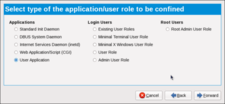SELinux Sandbox for Untrusted Programs
The security framework SELinux is set to offer a Sandbox in which applications deemed insecure can be partitioned off from other system areas.
Red Hat colleagues Dan Walsh and Eric Paris have designed an additional security tool. SELinux project leader Walsh describes the functionality and development of this tool in a detailed blog entry. The main idea: for SELinux to limit the actions an application can perform and to confine untrusted binaries. This way, users should be able to work with programs and data that are not considered 100% secure.
The developers were inspired to create a sandbox to execute these security measures using the SELinux policies via a query on the Linux core list. Walsh describes: "The bug report talked about confining grep, awk, ls ... The idea was couldn't we stop the grep or the mv command from suddenly opening up a network connection and copying off my /etc/shadow file to parts unknown.“ Regarding further application areas, Walsh sees GRID jobs as potential danger, they might become Spam Bots or attack systems in some other form.

According to Walsh, only 10 clicks were needed to write the policy with the GUI program from Fedora 11. He delivers interested parties precise instructions. In addition to the policy, the “usr/bin/sandbox” tool was written in order to route contents into the Sandbox. One issue with the current version has not yet been fully dealt with: “My current intention with sandbox is not to handle X Apps, since these apps want to write all over the home directory ~/.gconf, ~/gnome., ~/.config ... and all over /tmp, along with use privs to talk to the X Server. I have some ideas on this for the future that I hope to experiment with.”
In a message on the Linux kernel list, Eric Paris introduces a simple application example and invites users to share their experiences. “Check it out, SELinux confinement made easy."
Subscribe to our Linux Newsletters
Find Linux and Open Source Jobs
Subscribe to our ADMIN Newsletters
Support Our Work
Linux Magazine content is made possible with support from readers like you. Please consider contributing when you’ve found an article to be beneficial.

News
-
Linux Kernel Project Releases Project Continuity Document
What happens to Linux when there's no Linus? It's a question many of us have asked over the years, and it seems it's also on the minds of the Linux kernel project.
-
Mecha Systems Introduces Linux Handheld
Mecha Systems has revealed its Mecha Comet, a new handheld computer powered by – you guessed it – Linux.
-
MX Linux 25.1 Features Dual Init System ISO
The latest release of MX Linux caters to lovers of two different init systems and even offers instructions on how to transition.
-
Photoshop on Linux?
A developer has patched Wine so that it'll run specific versions of Photoshop that depend on Adobe Creative Cloud.
-
Linux Mint 22.3 Now Available with New Tools
Linux Mint 22.3 has been released with a pair of new tools for system admins and some pretty cool new features.
-
New Linux Malware Targets Cloud-Based Linux Installations
VoidLink, a new Linux malware, should be of real concern because of its stealth and customization.
-
Say Goodbye to Middle-Mouse Paste
Both Gnome and Firefox have proposed getting rid of a long-time favorite Linux feature.
-
Manjaro 26.0 Primary Desktop Environments Default to Wayland
If you want to stick with X.Org, you'll be limited to the desktop environments you can choose.
-
Mozilla Plans to AI-ify Firefox
With a new CEO in control, Mozilla is doubling down on a strategy of trust, all the while leaning into AI.
-
Gnome Says No to AI-Generated Extensions
If you're a developer wanting to create a new Gnome extension, you'd best set aside that AI code generator, because the extension team will have none of that.
